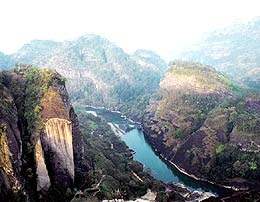 Mount Wuyi 武夷山 is the home of many famous oolong teas including the Famous Five Rock Teas (五大岩茶). The Wuyi Mountain Range, usually called Greater Wuyi Mountain, straddles the border of Fujian and Jiangxi provinces, stretching over 500 kilometers. The average height of the peaks is over 1,000 meters above sea level.
Mount Wuyi 武夷山 is the home of many famous oolong teas including the Famous Five Rock Teas (五大岩茶). The Wuyi Mountain Range, usually called Greater Wuyi Mountain, straddles the border of Fujian and Jiangxi provinces, stretching over 500 kilometers. The average height of the peaks is over 1,000 meters above sea level.It has ideal conditions for growing oolong tea. The Wuyi Mountain range acts as a natural barrier against cold northern winds while also retaining the warm moist air from the south. Shu Xian tea is grown at an altitude of about 800 meters in a fog enshrouded environment that received plenty of rainfall.
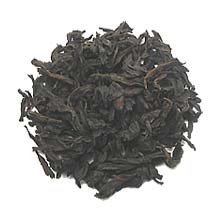 Da Hong Pao 大红袍 is the king of the Famous Five Rock Teas in the Wuyi Mountain of China. This tea is legendary. Records of its existence date as far back as the early 18th century (Dao Guang Era). During Qing Dynasty, Da Hong Pao was entitled "King of Tea". Da Hong Pao is one of the most expensive teas sold in auction history. In 1998, the Chinese government put it up for sale for the first time and was sold to a group of auctioneers for almost $900,000. This special made Da Hong Pao is fully hand processed using traditional method passed down from many generations to members of the "Ge" family.
Da Hong Pao 大红袍 is the king of the Famous Five Rock Teas in the Wuyi Mountain of China. This tea is legendary. Records of its existence date as far back as the early 18th century (Dao Guang Era). During Qing Dynasty, Da Hong Pao was entitled "King of Tea". Da Hong Pao is one of the most expensive teas sold in auction history. In 1998, the Chinese government put it up for sale for the first time and was sold to a group of auctioneers for almost $900,000. This special made Da Hong Pao is fully hand processed using traditional method passed down from many generations to members of the "Ge" family.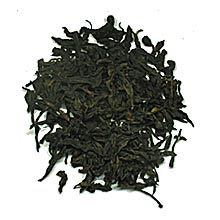 Rou Gui 肉桂 is the latest tea added to Wuyi's famous five bushes (previously only four consisting of Tie Luo Han, Shui Jin Gui, Da Hong Pao and Bai Ji Guan; referred to as Si Da Ming Cong). All these teas originate from Mount Wuyi in Northern Fujian of China. They are also called Yan Cha (Rock tea) due to the pristine rocky areas where the tea bushes grow. In the early 80s, Rou Gui growing area is only a few Mu (6 acres = 1 Mu) but has increased to 30,000 Mu today, a testament to its quality and popularity.
Rou Gui 肉桂 is the latest tea added to Wuyi's famous five bushes (previously only four consisting of Tie Luo Han, Shui Jin Gui, Da Hong Pao and Bai Ji Guan; referred to as Si Da Ming Cong). All these teas originate from Mount Wuyi in Northern Fujian of China. They are also called Yan Cha (Rock tea) due to the pristine rocky areas where the tea bushes grow. In the early 80s, Rou Gui growing area is only a few Mu (6 acres = 1 Mu) but has increased to 30,000 Mu today, a testament to its quality and popularity.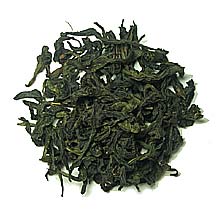 One of Wuyi top five teas, Shui Jin Gui 水金龟, which means "Golden Turtle" is strong and rich tea with a very slight hint of fruity aroma. According to Chinese legends, Shui Jin Gui tea plant is a transmigration of a turtle god. Despite achieving godhood after a thousand years of meditation, the turtle god soon felt discontented as his hard effort as the Heaven's Tea Gardener often went unnoticed. One morning, he awoke to the noise of tea farmers celebrating their harvest of first flush tea leaves happily. Upon seeing this, the turtle god realised that he would be better appreciated as a tea plant and thus he gave up his immortality to become the Shui Jin Gui tea plant.
One of Wuyi top five teas, Shui Jin Gui 水金龟, which means "Golden Turtle" is strong and rich tea with a very slight hint of fruity aroma. According to Chinese legends, Shui Jin Gui tea plant is a transmigration of a turtle god. Despite achieving godhood after a thousand years of meditation, the turtle god soon felt discontented as his hard effort as the Heaven's Tea Gardener often went unnoticed. One morning, he awoke to the noise of tea farmers celebrating their harvest of first flush tea leaves happily. Upon seeing this, the turtle god realised that he would be better appreciated as a tea plant and thus he gave up his immortality to become the Shui Jin Gui tea plant.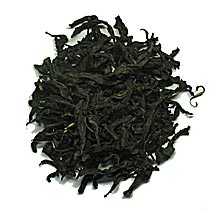 Tie Luo Han 铁罗汉 is also one of the Famous Five Wuyi Rock Teas and also believed to be the earliest Wuyi tea; with history records dating back to Song Dynasty. The tea bush was first found in a cave (Gui Dong or Ghost Cave) in Hui Yuan Yan, one of the ninety-nine cliffs of Mount Wuyi. Legend tells that this tea was created by a powerful warrior monk with golden-bronze skin, hence the name Tie Luo Han, which means "Iron Warrior Monk".
Tie Luo Han 铁罗汉 is also one of the Famous Five Wuyi Rock Teas and also believed to be the earliest Wuyi tea; with history records dating back to Song Dynasty. The tea bush was first found in a cave (Gui Dong or Ghost Cave) in Hui Yuan Yan, one of the ninety-nine cliffs of Mount Wuyi. Legend tells that this tea was created by a powerful warrior monk with golden-bronze skin, hence the name Tie Luo Han, which means "Iron Warrior Monk".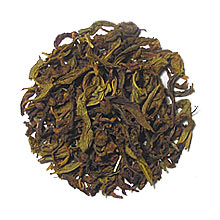 Legend has it that the name of this marvellous tea, Bai Ji Guan 白鸡冠 (White Cockscomb) was given by a monk in memorial of a courageous rooster that sacrificed his life while protecting his baby from an eagle. Touched by the display of courage and love, the monk buried the rooster and from that spot, the Bai Ji Guan tea bush grew. Bai Ji Guan's wonderful complex taste makes it one of the best Oolong in the world.
Legend has it that the name of this marvellous tea, Bai Ji Guan 白鸡冠 (White Cockscomb) was given by a monk in memorial of a courageous rooster that sacrificed his life while protecting his baby from an eagle. Touched by the display of courage and love, the monk buried the rooster and from that spot, the Bai Ji Guan tea bush grew. Bai Ji Guan's wonderful complex taste makes it one of the best Oolong in the world.

No comments:
Post a Comment